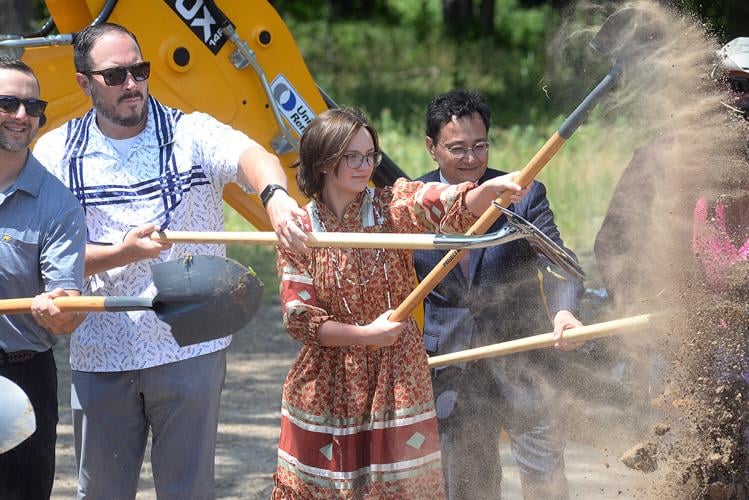
- Details
- By Chad Hunter, Senior Reporter, Cherokee Phoenix
TAHLEQUAH, Okla. – Construction of a sprawling, $10 million park near the Cherokee Nation’s tribal headquarters in Tahlequah kicked off June 21.
Named after the late principal chief, Wilma P. Mankiller Capitol Park – when completed in fall 2025 – will feature a community building, dog park, heirloom garden, amphitheater, stickball field, playground, walking trails, food truck area, water feature, a memorial statue to honor Mankiller herself, and more, all on 15 acres.
The Cherokee Nation-owned acreage is located at approximately 18050 S. Muskogee Ave., across the street from the Tribal Complex.
“It is the capital, it is Chief Mankiller, so we think this will be really the gem of our parks system, which is developing,” Cherokee Nation Principal Chief Chuck Hoskin Jr. said.
The chief’s daughter, Jasmine, helped plant the seed for a park in that area.
“When she was younger – at this point it’s been about four years ago – she was saying there’s nowhere to play on this part of Tahlequah; can we at least have a swing set?” Hoskin said. “It did get us thinking about Cherokee Nation’s role in developing parks and recreation.”
To address that need, the tribe later passed the Cherokee Nation Park, Wildlands, Fishing & Hunting Reserve Act and the Principal Chief Wilma P. Mankiller Capitol Park Act.
“I never did forget what my daughter had said and encouraged us to do,” Hoskin said at the future park site. “That’s special for me personally as a father, but I think for the Cherokee people this is going to be something for families, friends, visitors.”
The park’s namesake, Mankiller served as principal chief from 1985-95. She is noted as having fought for civil rights and equality, along with self-sufficiency for the Cherokee people. In addition, she is described as “the anchor” in establishing what has now become the largest tribal health care system in the country.
“The first woman to be elected chief of a major American Indian tribe, she revitalized the Nation’s tribal government, and advocated relentlessly for improved education, health care and housing services,” a biography from the National Women’s History Museum states.
Olaya said the tribe was continuing her mother’s legacy “by working with the concept of gadugi,” a Cherokee word that describes the value of working together for the common good.
“That’s really what she was about – community, gathering, helping one another, being respectful and kind to one another,” Olaya said.
The park’s designer is Cherokee Nation citizen Donna Edmondson of Edmondson Design Group.
“I’m so humbled and honored to be in on this project because Wilma was a friend,” Edmondson said. “Wilma, she was humble. She loved the Cherokee people, all people, but you know, especially Cherokees. She’s a legend. We had Wilma in mind as we (designed the park).”
While the park will have conventional amenities like a playground, it will also feature “special elements that are uniquely Cherokee,” Hoskin said, noting that the design itself will offer “a sense of Cherokee culture.” Portions of the park will be left bare, he added, “so people can enjoy, some perhaps, peaceful time at this park.”
The Hoskin administration’s proposal to build a park in the Cherokee Nation’s capital city of Tahlequah was unanimously approved by the Tribal Council in July 2022. A year later, the council approved increasing the park’s cost from $5 million to $10 million and increasing the lot size, which was initially 6.25 acres.
“It’s a $10 million investment, but when you look at the designs … you’re going to see that it’s an investment worthy of Chief Mankiller,” Hoskin said. “So, it’s a great day and it’s going to be a beautiful park.”
According to the park act, the primary funding source is federal American Rescue Plan Act dollars under the Cherokee Nation COVID-19 Respond, Recover and Rebuild Plan. Other funding sources include the Cherokee Nation Public Health and Welfare Fund Improvement Act, the Housing, Jobs and Sustainable Communities Act of 2022 and certain CN dividends.
Construction of the new park is one of more than 60 Cherokee Nation projects across the reservation worth a combined total of nearly $1.2 billion, representing the largest single capital investment in Cherokee Nation history.
Help us defend tribal sovereignty.
At Native News Online, our mission is rooted in telling the stories that strengthen sovereignty and uplift Indigenous voices — not just at year’s end, but every single day.
Because of your generosity last year, we were able to keep our reporters on the ground in tribal communities, at national gatherings and in the halls of Congress — covering the issues that matter most to Indian Country: sovereignty, culture, education, health and economic opportunity.
That support sustained us through a tough year in 2025. Now, as we look to the year ahead, we need your help right now to ensure warrior journalism remains strong — reporting that defends tribal sovereignty, amplifies Native truth, and holds power accountable.
 The stakes couldn't be higher. Your support keeps Native voices heard, Native stories told and Native sovereignty defended.
The stakes couldn't be higher. Your support keeps Native voices heard, Native stories told and Native sovereignty defended.
Stand with Warrior Journalism today.
Levi Rickert (Potawatomi), Editor & Publisher

